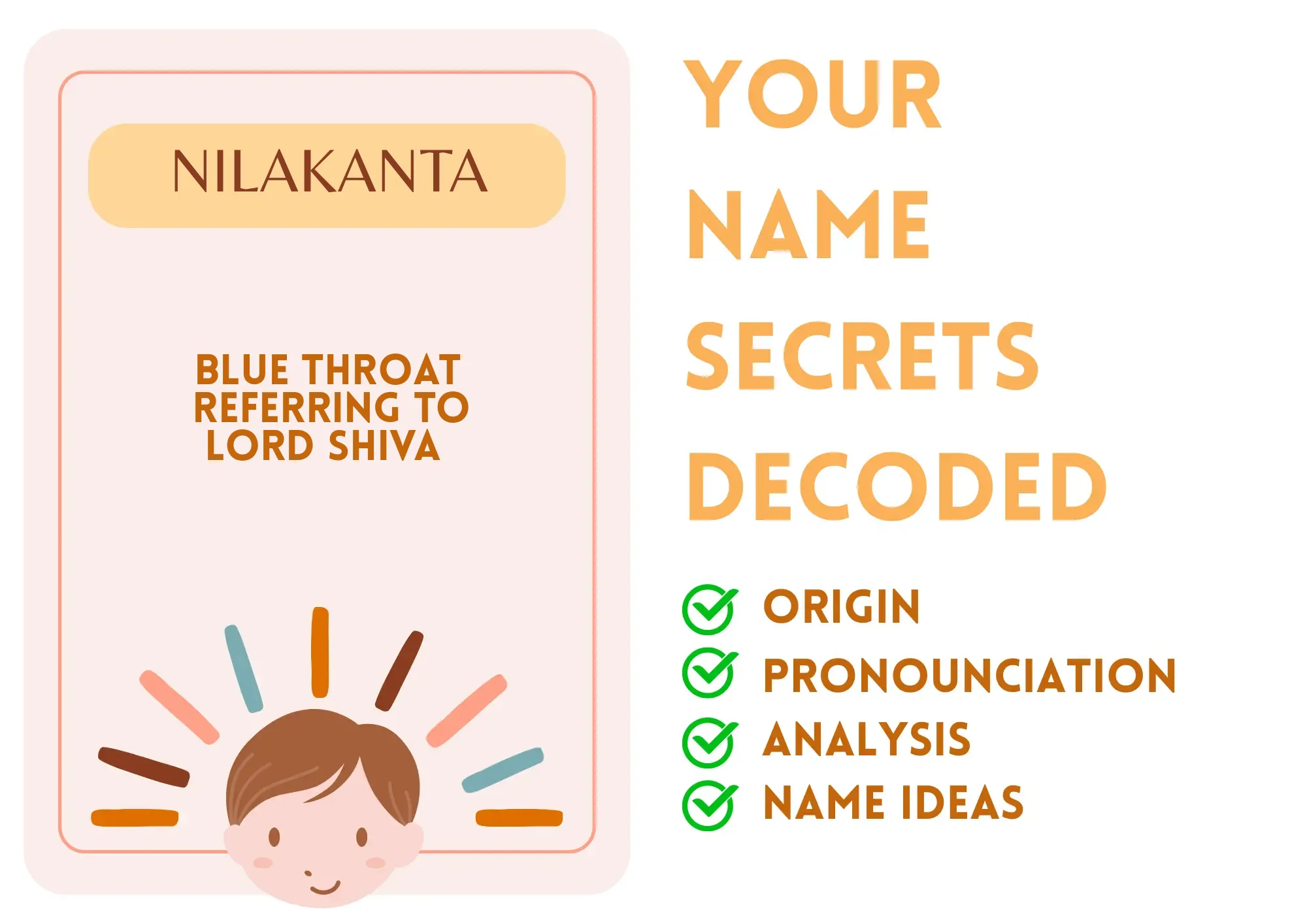
Nilakanta
Nilakanta is a name of profound significance in Hinduism, deriving from Sanskrit, where it translates to 'blue throat'. This name is primarily associated with Lord Shiva, who gained this epithet due to his act of consuming poison to save the universe. Nilakanta is predominantly used in India and among Indian communities globally, primarily as a masculine name although it can be considered unisex in broader interpretations.
The name carries deep cultural and religious meanings, symbolizing sacrifice, preservation, and the strength to endure challenges for the greater good. It is well-regarded, resonating positively with connotations of wisdom and resilience.
Nilakanta can evoke a sense of mystique due to its unique sounds and the mythological narratives attached to it, making it an appealing choice for parents looking for meaningful names grounded in rich tradition.
Basic Information
Gender: Boy
Sounds Like: NEE-luh-KAHN-tah
Pronunciation Explanation: The emphasis is on the second syllable 'KAHN', while the first syllable is pronounced 'NEE', and the last syllable is pronounced 'tah'.
Summary and Meaning
Meaning: blue throat (referring to Lord Shiva)
Origin: The name has its roots in India, specifically within the Sanskrit language and Hindu religious texts.
Usage: Nilakanta is traditionally a masculine name, primarily given to boys in the Hindu community.
Name Number (Chaldean)
Name Number (Pythagorean)
Name Constellation (Nakshatra)
Name Zodiac Sign (Rashi)
Popularity (Global Rank)
Overall: 186531
Boys: 72681
Most Popular in
Religious and Cultural Significance
Religion: Hindu
Background: In Hindu culture, Nilakanta is a significant name linked to Lord Shiva, embodying the qualities of protection and sacrifice.
Cultural Significance: The name is culturally significant due to its ties to Hindu mythology, symbolizing the ability to overcome adversity for the welfare of the world.
Historical Significance: Nilakanta, linked to the tales of Lord Shiva, is steeped in historical implications reflecting the dynamics of good and evil, often recounted in various Hindu scriptures and texts.
Popular Culture
Literature and Mythology: The stories of Nilakanta are prominent in texts like the Bhagavata Purana, which narrates the mythological accounts of Lord Shiva.
Movies and Television: While Nilakanta may not appear frequently as character names in modern films, references to Lord Shiva and his epithets are inherent in numerous Indian narratives across cinema.
Feelings and Perceptions
Perception: Nilakanta is regarded positively, associated with divinity, wisdom, and resilience. Many appreciate its rich mythological roots.
Positive Feelings: Unique, divine, strong, wise, meaningful, connected to spirituality.
Negative Feelings: Some may find it too complex or unfamiliar in non-Hindu contexts.
Practical Considerations
Ease of Writing and Calling: Nilakanta is a bit longer, consisting of four syllables, which may pose a slight challenge in pronunciation for some outside its cultural context, but it is phonetically logical.
Common Typos and Misspellings: Nilakanta,Nila Kanta,Nillakanta,Nillakanta
Common Nicknames: Nila,Kanta,Niki
Nilakanta Popularity
Nilakanta Usage and Popularity By Country
| Country | Rank (Overall) |
|---|---|
| India | 36515 |
| United States | 539518 |
Nilakanta Usage and Popularity By City
| City | Rank (Overall) |
|---|---|
| Bengaluru | 26501 |
| Thoubal | 43 |
| New Delhi | 18092 |
| Imphal | 274 |
| Calcutta | 15278 |
Compatibility Analysis
Famous Persons Named Nilakanta
Related Names
Similar Sounding Names:
Nikhil,Nina,Niranjan,Nilay